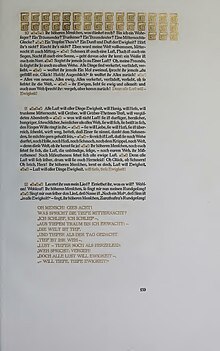
Zarathustra's roundelay


Zarathustra's roundelay (German: Zarathustra's Rundgesang),[1] also called the Midnight Song (Mitternachts-Lied[2]) or Once More (German: Noch ein Mal),[3] is a poem in the book Thus Spoke Zarathustra (1883–1885) by Friedrich Nietzsche.

The poem first appears in Thus Spoke Zarathustra's chapter "The Second Dance-Song", then reappears in a later chapter, "The Drunken Song".[3]

The poem was used by Gustav Mahler as the text of the 4th movement of his Symphony No 3.

German original
O Mensch! Gib acht!
Was spricht die tiefe Mitternacht?
»Ich schlief, ich schlief—,
Aus tiefem Traum bin ich erwacht:—
Die Welt ist tief,
Und tiefer als der Tag gedacht.
Tief ist ihr Weh—,
Lust—tiefer noch als Herzeleid:
Weh spricht: Vergeh!
Doch alle Lust will Ewigkeit—,
—will tiefe, tiefe Ewigkeit!«
Selected English translations

O man! Lose not sight!
What saith the deep midnight?
"I lay in sleep, in sleep;
From deep dream I come to light.
The world is deep,
And deeper than ever day thought it might.
Deep is its woe—
And deeper still than woe—delight.
Saith woe: 'Pass, go!
Eternity's sought by all delight—,
Eternity deep—by all delight!'"

O man! Take heed!
What saith deep midnight's voice indeed?
"I slept my sleep—
"From deepest dream I've woke and plead:—
"The world is deep,
"And deeper than the day could read.
"Deep is its woe—
"Joy—deeper still than grief can be:
"Woe saith: Hence! Go!
"But joys all want eternity—
"Want deep profound eternity!"
Textual characteristics
This section is empty. You can help by adding to it. (January 2023) |
Interpretation
This section is empty. You can help by adding to it. (December 2022) |
See also
References
- ^ Hollinrake, Roger (1982). "7. Zarathustra's Great Noon". Nietzsche, Wagner and the Philosophy of Pessimism. Routledge. p. 92. doi:10.4324/9780203092705. ISBN 978-0-203-09270-5.
- ^ Stegmaier, Werner (21 March 2019), Bertino, Andrea C. (ed.), "12. "Oh Mensch! Gieb Acht!" Kontextuelle Interpretation des Mitternachts-Lieds aus Also sprach Zarathustra", Europa im Geisterkrieg. Studien zu Nietzsche, OBP collection (in German), Cambridge: Open Book Publishers (published 2018), pp. 333–361, ISBN 979-10-365-2455-4, retrieved 2023-01-21
- ^ a b Puffett, Derrick (1998). "A Nietzschean Libretto: Delius and the Text for 'A Mass of Life'". Music & Letters. 79 (2): 244–267. doi:10.1093/ml/79.2.244. ISSN 0027-4224. JSTOR 854955.
- ^ Nietzsche, Friedrich Wilhelm (1899). Thus spake Zarathustra: a book for all and none. The Works of Friedrich Nietzsche. Vol. II. London: T. Fisher Unwin. pp. 339–40, 483.
- ^ Nietzsche, Friedrich, "Part Three", Thus Spake Zarathustra, retrieved 2022-12-24
Further reading
- Hollinrake, Roger (1982). "6. Zarathustra's Roundelay". Nietzsche, Wagner and the Philosophy of Pessimism. Routledge. doi:10.4324/9780203092705. ISBN 978-0-203-09270-5.
- Stegmaier, Werner (21 March 2019), Bertino, Andrea C. (ed.), "12. "Oh Mensch! Gieb Acht!" Kontextuelle Interpretation des Mitternachts-Lieds aus Also sprach Zarathustra", Europa im Geisterkrieg. Studien zu Nietzsche, OBP collection (in German), Cambridge: Open Book Publishers (published 2018), pp. 333–361, ISBN 979-10-365-2455-4, retrieved 2023-01-21
External links
See what we do next...
OR
By submitting your email or phone number, you're giving mschf permission to send you email and/or recurring marketing texts. Data rates may apply. Text stop to cancel, help for help.
Success: You're subscribed now !

